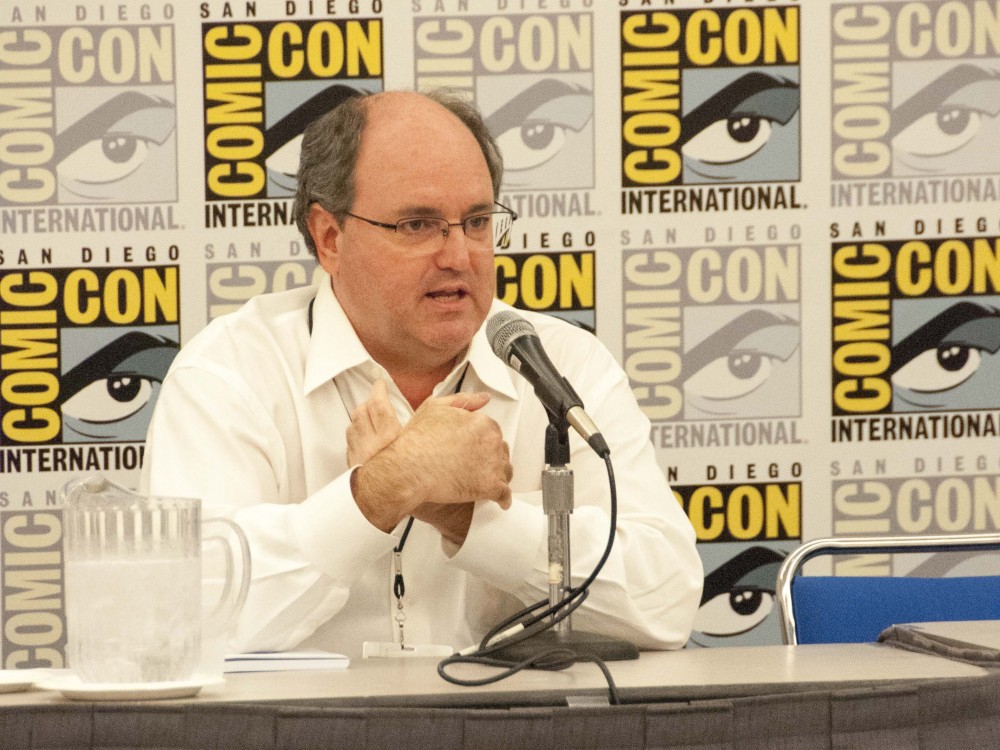
By Nick Eskey
San Diego Comic-Con has come and gone. As in every year, to officially close convention, we are gathered before John Rogers, Comic-Con International President, for the ever so important “Talk Back” panel. It is here that attendees can voice their concerns, suggestions, or applause this year’s convention, so that John can hear them personally.
Comic-Con’s president introduced himself, and thanked staff, security, volunteers, exhibitors, and others before opening up the microphone to the waiting crowd. And as usual, the crowd extended nearly to the back of the room.
Some of the concerns brought up dealt with the constant concern for lines. Lines for merchandising and booths have become a recent issue. One attendee brought up the issues he was having with the “Funko” booth. “The line was so disorganized, and constantly closed throughout the day. There was even one day where they stopped selling all together as of 4pm.” I have had my personal experience with Funko. To get even a chance to stand in line to buy, you either have to be the first one in the hall, or lucky to be passing by when they open up. Over the weekend, they started passing out line tickets. As people first entered the exhibit hall, they would have to get a ticket, get to the line, and then wait in line to eventually buy. This added step seemed to compound issues, as the ticket passers didn’t announce they were passing tickets, and only mentioned something if you got within arms distance. Those that raced by to get to the booth received the news there that they needed a ticket.
Another cause for concern was how exhibitors were still getting into lines by switching out for a regular attendee pass. “I was upset when I saw an exhibitor in the autograph line that I couldn’t even get into,” said one woman. “This has been an ongoing issue for a while on how exhibitors are ‘magically’ producing regular passes,” responded Rogerss. “Unfortunately there’s nothing we can do about it.”
To address the crowds on the sales floor, one man proposed the use of directional lines on the floor. “As you might have noticed, we are such things when large signings are taking place,” said John. The man wished the lines though to happen throughout the convention. Many a person in the room grumbled at this. “I’m pretty sure no one would like anymore rules to complicate things,” added John Rogers.
Reiterated by many was the lack of communication from the different security companies employed by Comic-Con. “One guard had my attendant sit far away from me in Hall H. And other guards were giving me issues over where my attendant was… I need my attendant in eyesight at all times. I don’t know why that guard would have me sit away from him.” Another attendee said that one guard was handing out passes, where there were others just standing around. When he asked why there weren’t helping, they said “oh that’s not our department.”
Now, for the most reoccurring issue: those with disabilities and the services available to them. Many of the attendees with these concerns had actually positive things to say about this year’s services. But the lines for Hall H were still major issue. “On Friday, the general line went in forty-five minutes before the ADA line… I felt like we were forgotten,” said one woman with disabilities. “When we finally got in, many of the red seats marked off for disabled were already taken.”
Another Hall H issue was that the ADA lines were uncovered. “There are many of us that can’t stand in the sun as part of our disability,” said one woman. The same issue was brought up over and over again.
New this year was the addition of wristbands for the ADA line, to help gauge the number of available spot. For the most part, it was met with positive feelings. A few issues did arise though when it came with the actual issuing of said wristbands. “Security would come out and say that there might not be enough bands. Then maybe an hour later they would come out and say there’s six. Another hour later and they’d have four more. Is it that hard to just count the spot and let us know?”
John Rogers responded, “We haven’t come up with a better system to figure out how many spaces we have left till wristbands have been passed out… It’s actually difficult to keep a working number and go off of that.” The woman then asked about making three lines then, or doing a straw pull for wristbands. “We’ll think of that,” said John.
There’s also the issue of those with disabilities and the use of elevators. “The wait for the elevator was extremely long,” said an attendee. “By the time I got to the autograph area, they had caped the line.” For this year’s convention, they’ve had those with ambulatory disabilities use the elevators as opposed to the escalators. “It was a decision we made to be fair to everyone,” replied John. “We were seeing those with ambulatory issues being rushed around by other attendees for the escalators.”
One woman suggested that Comic-Con should have those claiming they have disabilities to show proof, so as to not be accessible to services if they are not. This elicited a quick response from the president. “By California state law, the only ones that can ask for proof of disability is the police.” The woman couldn’t believe that, but many from the crowd agreed with John. “That’s how Disney got in trouble recently at their park,” he added.
The biggest upset was when one woman said, “I was told by Disabled Services that this was the last year my attendant could get a complementary pass. And if they couldn’t get one through the lottery, ‘then they would be out of luck.’ I need my attendant. If he can’t come, I can’t come either. And I’ve been coming for twenty years. I don’t mind if he needs to buy one now, but then please put into place a system that he is guaranteed purchase.”
This seemed to catch John Rogers off guard. “Attendant badges are always complementary, so I don’t know why they would say that to you,” he said. Half a dozen in the line confirmed that they also were told the same thing. John looked at the line and said “We will fix that.”
This panel went on for an hour and a half; one of the longest Talk Backs to happen, with most of the issues dealing with Disabled services. Though it seems the guard issue has lessened this year as compared to others in the past, the concerns with ADA have not. If anything, they seem to be growing. When it comes to something like Comic-Con, it’s important that the whole experience is accessible to all fans that wish to partake. As the convention will remain in San Diego for at least a little while longer, let’s see if they can better address these issues.









The disabled attendees are by far the most privileged class at the con. I’ve never been to any other show that does as much as CCI does for the disabled and yet every year the vast majority of complaints are from the disabled attendees.
At some point there needs to be some personal responsibility. One person was upset bec he only got 16 hrs of sleep for the whole con bec he had to wait in line for hall h and needed a cpap machine. Maybe place less importance on hall h and more on your health like everybody else.
Another was upset that one person was only given water for dehydration rather than something with electrolytes. Supply the hydration you need.
Every year there is someone complaining that then didn’t get every exclusive they wanted. Nobody does.
There was another who mentioned that they would have stood in general line if they knew Ada wouldn’t get them in. If you are capable of standing in the general line, then leave the Ada live for those who really need it.
People masquerading as disabled at the con is just as bad a problem as dealers getting in line with attendee badges. Some legislation needs to be passed to fix it in the state.
Trev, There are definite problems with how the disabled are being treated or mistreated at CCSD. During the Talk Back the majority of comments and complaints were made by the disabled attendees which to me means that there is a serious problem that needs to be addressed. For many years I have seen mishandling of the disabled where they were made to suffer unnecessarily by the line policies for Hall H. The disabled are not a “privileged class” as you stated in your comment and have laws protecting their ability and right to attend Comic Con just like you. Anyone who is lucky to live long enough will eventually also need disabled services sooner or later. If you don’t want to hear people talk about their difficulties with their Con experience at Talk Back, there are other panels to attend. Overall the able bodied as well as the disabled were never angry or nasty about what they were communicating to Rogers and hopefully some positive changes can be made for next year if we are lucky enough to get tickets again.
Show me any other con that goes to the lengths of cci in their efforts – still they press for more.
Nobody has a right to anything at sdcc – they pretty much spell that out and that policy is the one that leads to the problems. If they just ticketed hall h and ballroom 20, most of these issues go away.
I think that like every other faction at the con, the disabled are leveraging their numbers and the talkback panel to get what they want.
I go to talkback to see the train wreck of ludicrous complaints. Yes there were some legit problems but most of it is people who believe they are owed something that they aren’t.
Here’s how to fix it:
1. Ticket or split off hall h – there was a good suggestion about using the arena across town.
2. Set reasonable policies on exclusives that provide more reasonable volumes or not at all.
3. Hire security that can be empowered better to help and understand what’s a problem and what isn’t. The current situation is run by hard rules and it creates unnecessary issues and confrontations.
4. Figure out a way to crack down on the able bodied abusing the disabled system.
This is that guy that only slept 16 hours and needed his CPAP machine. You apparently only caught part of what I was saying, which is, that if they had not removed the outlets I could have used my CPAP machine and slept outside just fine. Besides that, however, you missed the point completely which is not everyone with disabilities can sleep outside. Because of that they should be given special consideration for their placement in line. What other convention gives ADA this sort of consideration? Try Emerald City Comic Con and PAX Prime, both in Seattle and both allow ADA to ALWAYS be first in line. Try DragonCon in Atlanta, where ADA have volunteers that will guide them through the convention, hold their spot in line and generally assist them in whatever way needed. I was on the BoD for OkCon and we bent over backwards to assist our ADA. Maybe because we had people on the board with disabilities.
People say that anyone that can sleep outside for an extended period should be in general. Which means you are saying that people like me, veterans, that were injured serving our country should not have our service or sacrifice recognized. You are overlooking that there are a wide range of disabilities all with different needs and concerns. Someone that has lost a leg could probably sleep outside just fine but should they have to? No.
There are ways to compromise. I am not looking for a “do it my way or else” but will do my best to make sure everyone’s disabilities are recognized and treated fairly.
So here’s the trick – if nobody sleeps outside then there are no issues. How do we stop that? Rather than make sleeping outside like sleeping in your room or allowing some to not have to do tgat – why not all? If CCI gave out tix to Hall H on various days the overcapacity situation disappears and suddenly it’s down 30%. So much effort and dollars goes into something that doesn’t have to be that way.
Also let me ask you randy – why not just skip a day in hall h and do something else? You made a decision to run on 16 hrs. I’m not baiting, I’m genuinely curious. It seems like putting yourself through that over some panels isn’t sonething many would do.
I’m going to leave the politics of veterans and what they deserve aside.
if you can sleep outside just fine, why take an ADA seat from someone who really can’t? ADA accommodations aren’t a privilege or a reward. They’re a vital part of some people’s lives that allows them to enjoy experiences that would otherwise be inaccessible. If you don’t need them (or you only need them for certain things), don’t use them the rest of the time and allow those who really need the assistance to be served better.
It’s hard to wait in line and get a spot in Hall H for anyone. It will never be easy for the big panels without some major changes. And, it’s even harder to get a GOOD seat in Hall H. It is the responsibility of CCI to equalize the experience between disabled/non-disabled in that situation, not make sure the disabled are always given the best seats or that everyone who is disabled gets a seat (just like how everyone who is not disabled can’t get a seat as well). I feel like the point of ADA accommodations should be to ensure that those with disabilities are able to enjoy the experience as easily as those without disabilities. Not to elevate them above other attendees.
Beyond all this, it is very evident after attending just one panel that the ADA accommodations are abused at SDCC. Entire groups were in ADA seating at Hall H, while the one person in their group who was actually ADA was seated in the back. If the complaint is that there isn’t enough ADA seating, CCI should first crack down with the one attendant rule.
There is no arguing with the abled bodied who perceive the disabled as being “privileged” or abusing the system. Since 1990 the American Disabilities Act has protected the rights to help remove barriers so that the disabled could participate in all facets of daily life. I myself have gotten tickets for Comic Con for 10 consecutive years but spent the first 5 years not knowing that there was a Disabled Services at Comic Con and spent the majority of my time in a nearby hotel room while my family enjoyed the Con. The prior posts have detailed solutions to solve the Hall H problem for both the able bodied and the disabled. Over the last 10 years I have seen Comic Con grow to the point where crowd and line management are problematic. The heart of the problem is the fact that SDCC has outgrown its facilities and that in order to accommodate the increased numbers of attendees a bigger convention center is needed. I hate to say this because I love the San Diego location but maybe Comic Con should have moved instead of prolonging the misery until 2018. Without a bigger venue there will be a repeat of the Hall H and the ADA compliance issues.
Can someone please answer this question? Since SDCC is a Non-Profit 501c3, is the full cost or part of the cost of my badge considered a tax deductible donation? In order to claim it as a tax deductible item you will need proof that has SDCC’s tax I.D. number on it. Just wondering, since I just heard about their tax exempt status a few days ago.
I have a question. Since SDCC is a tax exempt 501c3, is full or part of the cost of the badge tax deductible? The cost of the badge would have to be considered a donation. If it is then to claim it on your taxes you would need something from SDCC that has their tax I.D. number on it. I just heard about this a few days ago and was surprised by their 501c3 status.
I just sent my question about the tax deductible badge to the SDCC website. I’ll tell you what they say.
The biggest issue I saw with the ADA lines started on preview night at the Funko booth. Myself and another person were attendants for two ADA people. They don’t require a wheelchair but one has had spinal fusion surgery and can’t use a whhelchair. Anyway we asked the person at the booth where the ADA line was and we went to stand in it. Well Funko were only helping ADA people if they were in a wheelchair and skipping the ones in line with them who were not in a chair. They said they were told by Comic-Con to only help ADA people in wheelchairs only. This happened at several booths. That is illegal. That’s discrimination. Not all ADA people require a wheelchair to get around even though it may be difficult for them. They prefer to be independant. But I saw it happen at several booths this year. All insisting it was comic con that told them to do that. I think it would be great if they could require paperwork to verify they are ADA to help weed out the ones who aren’t. But it needs to be fair to everyone.
@Trev I have a little girl with cerebral palsy and caring for her is a 24/7 part of my life. For one week out of the year, SDCC, I get away and recharge my batteries. I love movies, all of them. Old black and whites, B movies…I sometimes feel like that movie Get Shorty, John Travolta’s character, was me…minus the mob connection. In Hall H I can see actors that I adore, previews for coming movies and be among a host of geeks/nerds that love the same thing as me. It gives me the energy I need to go home and make it through the rest of the year. Would I survive if I didn’t get to go to Hall H, sure, but going to Hall H helps me to forget about everything even if its just for the duration of the convention.
As for the other people that don’t think ADA deserve special treatment. You are one slip on the steps, car accident, stroke…turn of fate away from having a disability. A drunk driver hits you and suddenly you are in a wheelchair, through no fault of your own. Or worse, you are partially brain dead and unable to communicate with anyone. Locked in a body that will not respond but fully understanding everything going on around you. Until you have a disability or have a close family member or maybe even a friend have a disability you will never understand why getting a little advantage here or there makes a big difference for them. My first two years at SDCC I didn’t realize there even was an ADA line. I suffered through the general line watching people that could move at normal speeds rush by me, cutting me off and generally not being concerned that I was limping along. I have been in both lines and know how it is from both sides. As I mentioned before I am looking for a fair compromise for both sides and have something in mind that will work. There’s no reason to voice it here, I talked to John Rogers about it already and will be emailing him a full write up this week.
Randy, Thank you for sharing your stories. As a survivor of brain surgery, cancer and now an autoimmune disease I understand your need to recharge and escape and recharge. We can’t escape our physical limitations but we can all join in the fun and fantasy of Comic Con.
I was standing in the Hall H line next to a young woman in her twenties who had been in a car accident when she was 16 and required 25 operations to to a point where she was walking and standing in line with two crutches. She couldn’t stand for long so her Attendant would hold her place in line while she sat on a distant concrete planter. I learn a lot about how lucky I am to still be alive from the people that share the Disabled line at Comic Con.
I tried looking for a Facebook page that focuses on the Disabled who attend SDCC but didn’t find anything. If there isn’t one already it would be great if someone started one and have it be a closed group so that the able bodied trolls would not be able to access the page. If you know of one please post that information.
Here is a link to a feel good article, “Comic-Con and beyond: Why many disabled people find comic culture relatable.”
@MN
If it’s like buying tickets for a fundraising event (which CCI is) then:
“If you receive a benefit as a result of making a contribution to a qualified organization, you can deduct only the amount of your contribution that is more than the value of the benefit you receive.”
http://www.irs.gov/publications/p526/ar02.html
Talk to your accountant.
Torsten, Thanks for the advice. I’ll be sure to talk to our accountant about the Comic Con ticket tax deduction and see how much of the ticket is tax deductible. We’ve gone to SDCC for 10 years and I never knew it was a 501c3. I would have been nice to have asked our accountant this question 10 years. Thanks again.
Comic Con tickets aren’t tax deductible unless you are attending as a business. The fact that CCI is 501c3 means that the company (CCI) is exempt from federal taxes. If CCI happened to have a fundraiser and you donated, that donation could be considered a tax write off. But tickets to the event do not fall under donations unless specified.
Comments are closed.